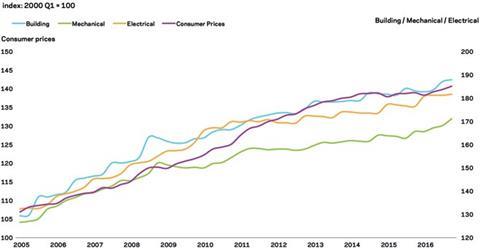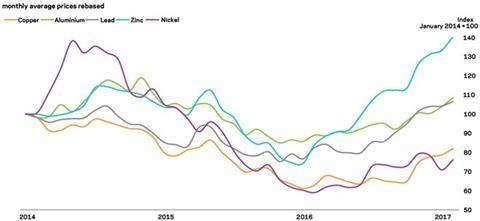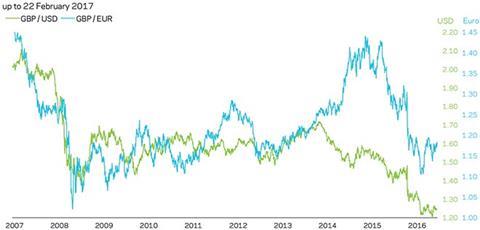The fall in the value of sterling has caused building costs and consumer prices to rise, while manufacturing input has taken a hard hit in the last year. Michael Hubbard of Aecom reports
01 / Key changes
Percentage change year-on-year (Q4 2015 to Q4 2016)
| % | Direction | |
|---|---|---|
| �ڶ����� cost Index | 2.6 | ▲ |
| Mechanical cost Index | 3.3 | ▲ |
| Electrical cost Index | 3 | ▲ |
| Consumer prices index | 1.2 | ▲ |
(Q4 2016 figures are provisional)
�ڶ����� cost index
A composite measure of building costs increased over the last 12 months by 2.6% at Q4 2016. Materials cost inflation increased notably over the period, resulting from a combination of sterling depreciation and new year price increases. Labour costs continue to rise solidly.
Mechanical cost index
The rate of annual change increased to 3.3% at Q4 2016, falling slightly from 3.4% in the preceding quarter. Notably, rates of annual change for materials have overtaken those for labour.
Electrical cost index
The electrical cost index increased by 3% over the year. Similarly to the mechanical cost index, materials inflation trends are higher than those for labour on an annual basis.
Consumer prices index
Consumer price inflation continued to pick up pace in the final quarter of 2016. Growing domestic inflationary pressures have resulted from a significant fall in the value of sterling.
The following chart shows Aecom’s index series since 2005, reflecting cost movements in different sectors of the construction industry and consumer prices.
Aecom indices

02 / Price adjustment formulae for construction contracts
Price Adjustment Formulae indices, compiled by the �ڶ����� Cost Information Service (previously by the Department for Business, Innovation and Skills), are designed for the calculation of increased costs on fluctuating or variation of price contracts. They provide guidance on cost changes in various trades and industry sectors and on the differential movement of work sections in Spon’s price books.
The 60 building work categories recorded an average increase of 5.4% on a yearly basis. The highest increases were recorded in the following categories:
Price adjustment formulae
| February 2016-February 2017 | % change |
|---|---|
| Cladding and covering: lead | 20 |
| Pipes and accessories: copper | 18.8 |
| Cladding and covering: copper | 18.2 |
| Cladding and covering: zinc | 16.9 |
| Windows and doors: steel | 16 |
| Concrete: reinforcement | 14.8 |
| Metal: decking | 11.1 |
The lowest yearly increases were in these groups:
Price adjustment formulae
| February 2016– February 2017 | % change |
|---|---|
| Pipes and accessories: clay and concrete | -0.6 |
| Insulation | 0 |
| Finishes: rigid tiles and terrazzo | 0 |
| Ironmongery | 0.5 |
| Finishes: flexible tiles and sheet coverings | 1.3 |
| Finishes: carpets | 1.6 |
| Concrete: in-situ | 1.6 |
Materials
03 / Summary
- Consumer price inflation increased by 1.8% in January 2017 compared with the same month a year earlier ▲
- Manufacturing input prices increased 20.5% in the year to January ▲
- Factory gate prices (output prices) rose 3.5% in the year to January 2017, marking a seventh consecutive increase ▲
- Commodity prices rises accelerated in Q4 2016 ▲
- Construction materials prices continued to increase on an annual basis at the end of 2016 ▲
04 / Key indicators
Construction industry
The All Work material price index increased by 3.7% in the year to December 2016. Housing-related materials increased by 3.6% over the same period. Non-housing materials prices also increased, by 3.4% annually. All M&E categories posted significant annual increases.
Construction materials
| % change, December 2015-December 2016* | ||
|---|---|---|
| New housing | 3.6 | ▲ |
| Non-housing new work | 3.4 | ▲ |
| Repair and maintenance | 4.2 | ▲ |
*provisional
| Mechanical services materials | % change, December 2015-December 2016* | |
|---|---|---|
| Housing only | 9 | ▲ |
| Non-housing | 6.5 | ▲ |
| Electrical services materials | 4.8 | ▲ |
*provisional
| Materials showing largest cost movements | % change, December 2015-December 2016 |
|---|---|
| Concrete reinforcing bars (steel) | 20 |
| Imported plywood | 11.3 |
| Imported sawn or planed wood | 9.6 |
| Fabricated structural steel | 5.3 |
| Insulating materials (thermal or acoustic) | 4.8 |
| Sanitaryware | 4.5 |
| Paint (non-aqueous) | -2.9 |
| Paint (aqueous) | -1.1 |
| Clay products: bricks | -2 |
| Other builders’ ironmongery | -2.6 |
| Metal sanitaryware | -2.6 |
| Particle board | -2.8 |
| Lighting equipment for roads | -5.1 |
Data sources: ONS and BEIS
UK economy
| Consumer prices | ||
|---|---|---|
| Consumer prices index (CPI) | 1.8 | ▲ |
Consumer price inflation rose over the year by 1.8% in January. Inflation reached its highest rate since June 2014, as inflationary pressures built from the fall in sterling against its major currency pairs. Rising raw materials costs are a major contributor to these increases. Further upward pressure on the headline annual rate of inflation is expected through 2017.
| Industry input costs | % change Jan 2016 – Jan 2017 | |
|---|---|---|
| Materials and fuels purchased by manufacturing industry | 20.5 | ▲ |
| Materials and fuels purchased by manufacturing industry excluding food, beverages, tobacco and petroleum industries | 11.8 | ▲ |
Source: ONS
Input prices increased by 20.5% on a yearly basis up to January 2017. This is the fastest rate of annual increase since Q3 2008. It also marks the seventh consecutive month of increases annually. The effects of weaker sterling experienced through 2016 are now beginning to be felt, raising sterling prices of imports. Additionally, the price for oil has stabilised at over $50/barrel (£41/barrel), which adds weight to overall input cost trends.
| Industry output costs | % change Jan 2016 – Jan 2017 | % change |
|---|---|---|
| Output prices of manufactured products | 3.5 | ▲ |
| Output prices of manufactured products excluding food, beverages, tobacco and petroleum | 2.4 | ▲ |
Source: ONS
Factory gate prices increased 3.5% on a yearly basis in January. This is the largest annual increase since January 2012 and marks the high point so far of a trend established in the middle of last year. A mixture of higher input costs, a stronger labour market and increased confidence among manufacturers to pass on higher prices to consumers contributed to recent changes.
Metal prices

Source: LME
| % change January 2016 – January 2017 | ||
|---|---|---|
| Aluminium | 21 | ▲ |
| Copper | 28.6 | ▲ |
| Lead | 35.8 | ▲ |
| Zinc | 79.4 | ▲ |
| Nickel | 17.7 | ▲ |
Source: LME
Yearly price increases for metal commodities accelerated at the end of 2016 and into 2017. A number of factors have played a part in the upward movement of prices: expectations of significant infrastructure expenditure in the US, successful efforts to address production over-capacity and apparent optimism on the prospects for the global economy.
Exchange rates

| January 2016 average | January 2017 average | % change | |
|---|---|---|---|
| GBP / EUR | 1.3257 | 1.1613 | -12.4 |
| GBP / USD | 1.4379 | 1.2351 | -14.1 |
Following sterling’s significant falls immediately after the EU referendum outcome, the currency has rallied a little against the euro and the US dollar. That said, it remains below long-run averages for both currencies. Prevailing uncertainty in the UK and elsewhere in the world leads to continuing fluctuations in the direction of sterling. This is likely to carry on while largely political issues around Brexit remain unresolved or under negotiation.
Labour
05 / Labour market statistics
- Average weekly earnings (total pay including bonuses) in construction fell marginally to £631 in December 2016, from £632 a month earlier. Annually, total earnings increased 5.2% in December on a single-month basis, and 6.5% annually on a three-month average basis. Regular pay (excluding bonuses and arrears) increased to £602 per week in December, with annual rates of 5.2% on a single-month basis and 4.6% using a three-month average.
- Construction industry regular and total pay continues to exceed changes to average earnings for the whole economy classification, which was broadly 2.5% at the end of 2016.
- Real average weekly earnings for the whole economy increased by 0.7% (regular pay) in December 2016.
06 / Wage agreements
Construction Industry Joint Council
Following negotiations between the parties to CIJC, the council has agreed a two-year agreement on pay and other conditions. Hourly pay rates increased by 2.5% from 25 July 2016 and will then rise by a further 2.8% in June 2017. Industry sick pay and subsistence allowance will also increase in line with the basic pay rate increases. Workers will receive an extra day’s holiday from 1 January 2017, which is worth an additional 0.4%. For more details on apprentice rates, daily fare and travelling allowance and other rates refer to CIJC document IR.2016.19.
Joint Council Committee of the Heating, Ventilating and Domestic Engineering Industry
A two-phase agreement has been agreed between BESA and Unite trade unions. Phase 1 includes 2% and 2.5% increases in the hourly wage rate effective from 3 October 2016 and 2 October 2017 respectively. Phase 2 covers the periods 2018/2019 and 2019/2020, involving increases in index and other benefits agreed in July 2016. Discussions on the 2018 and 2019 hourly wage rate will take place towards the end of 2016. The introduction of calculating daily fare and travel allowances has been changed from kilometres to miles. Workers’ annual holiday is to increase from 23 to 24 days effective from February 2020. For more information on the agreement, refer to JCC letter 117 of BESA.
The Joint Industry Board for the Electrical Contracting Industry
The electrical contracting industry has agreed a four-year wage deal, effective from January 2017. Hourly wage increases of 2% in 2017, 2.5% in 2018, 2.75% in 2019 and 3% in 2020. Introduction of a new mileage allowance and rate to replace travel allowance and travel time also comes into effect. Annual holidays increase to 23 days in 2019 and 24 days in 2020. For more information on the agreement, refer to the electricals’ and Unite wage agreement document – July 2016.
�ڶ����� and Allied Trades Joint Industry Council (BATJIC)
The �ڶ����� and Allied Trades Joint Industrial Council (BATJIC) agreed a two-year pay deal effective from 27 June 2016. Workers will receive a 2.5% pay rise this year and a further 2.5% increase in 2017. Lower paid operatives will get a bigger boost of 4% this year, followed by 2.5% next year. The agreement includes a commitment that if inflation in early 2017 is higher than 2.5%, then the 2017 pay rise will match this up to a limit of 3%.
The Joint Industry Board for Plumbing, Mechanical Engineering Services in England and Wales
A 2.5% increase in hourly rates came into effect from 4 January 2016. Employees’ rates of pay, allowances entitlements and benefits are published in promulgation No. 171 of JIB for Plumbing, Mechanical Engineering Services in England and Wales agreement.
The BATJIC rates of wages effective from 27 June 2016 are:
| Standard rates of pay for 39 hours per week | Per week | Per hour |
|---|---|---|
| S/NVQ3: Advanced | £459.81 | £11.79 |
| S/NVQ2: Intermediate | £395.85 | £10.15 |
| Adult General Operative | £351.00 | £9.00 |
| For entrants aged 19 years and over | ||
| £374.01 | £9.59 |
| £325.65 | £8.35 |
| Apprentices under 19 years of age | ||
| £325.65 | £8.35 |
| £307.71 | £7.89 |
| WAGE AGREEMENT SUMMARY | |||||
|---|---|---|---|---|---|
| The following table summarises the wage agreements currently in force for the principal wage fixing bodies within the construction industry | |||||
| Operatives | Agreement body | Current basic hourly rate | Effective since | Details in | Date of next review |
| Builders and civil engineering operatives | Construction Industry Joint Council | Craft rate: £11.61/hour | 25 July 2016 | Spon’s Architects’ and Builders’ Price Book 2017 | June 2018 |
| �ڶ����� & Allied Trades Joint Industrial Council (BATJIC) | S/NVQ3 Advanced Craft: £11.79/hour | 27 June 2016 | Spon’s Architects’ and Builders’ Price Book 2017 | June 2017 | |
| Plumbers | The Joint Industry Board for Plumbing Mechanical Engineering Services in England and Wales | Advanced plumber: £14.70/hour | 2 January 2017 | Spon’s Architects’ and Builders’ Price Book 2017 | January 2018 |
| Scottish and Northern Ireland Joint Industry Board for the Plumbing Industry | Advanced plumber: £13.68/hour | 4 July 2016 | Spon’s Architects’ and Builders’ Price Book 2017 | July 2017 | |
| H&V operatives | Joint Conciliation Committee of the Heating, Ventilating and Domestic Engineering Industry | Craftsman: £12.46/hour | 3 October 2016 | Joint Conciliation Committee of the Heating, Ventilating and Domestic Engineering Industry | End of 2016 for years 2018 and 2019 |
| Electricians (national) | The Joint Industry Board for the Electrical Contracting Industry | Approved electrician: £15.92 / hour (own transport) | 2 January 2017 | JIB for the Electrical Contracting Industry | A four-year agreement 2021 |
| Scottish Joint Industry Board for the Electrical Contracting Industry | Approved electrician: £15.92 / hour (own transport) | 2 January 2017 | SJIB for the Electrical Contracting Industry | A four-year agreement 2021 | |
Guide to data
Aecom’s cost indices track movements in the input costs of construction work in various sectors, incorporating national wage agreements and changes in materials prices as measured by government index series.
They are intended to provide an underlying indication of price changes and differential movements in the various work sectors but do not reflect changes in market conditions affecting profit and overheads provisions, site wage rates, bonuses or materials’ price discounts/premiums. Market conditions and commentary are outlined in Aecom’s quarterly Market Forecast (last published February 2017).







No comments yet